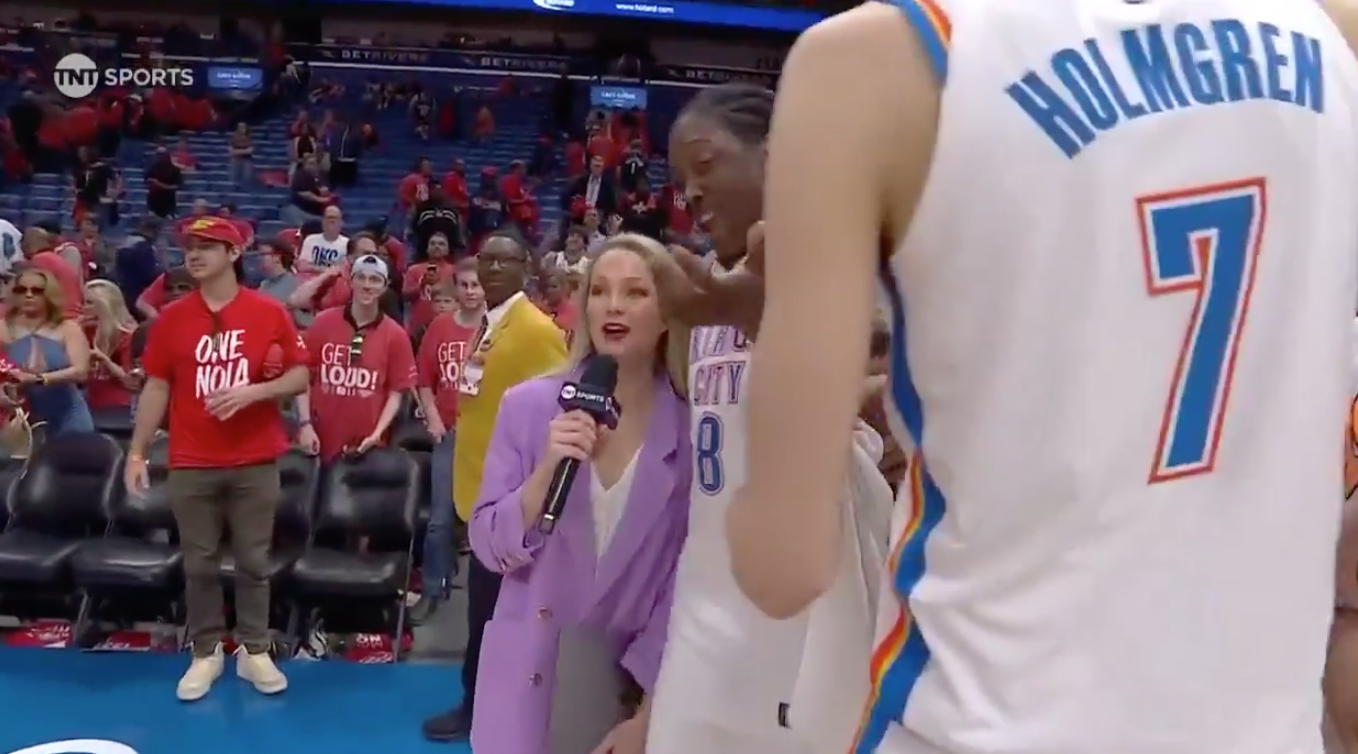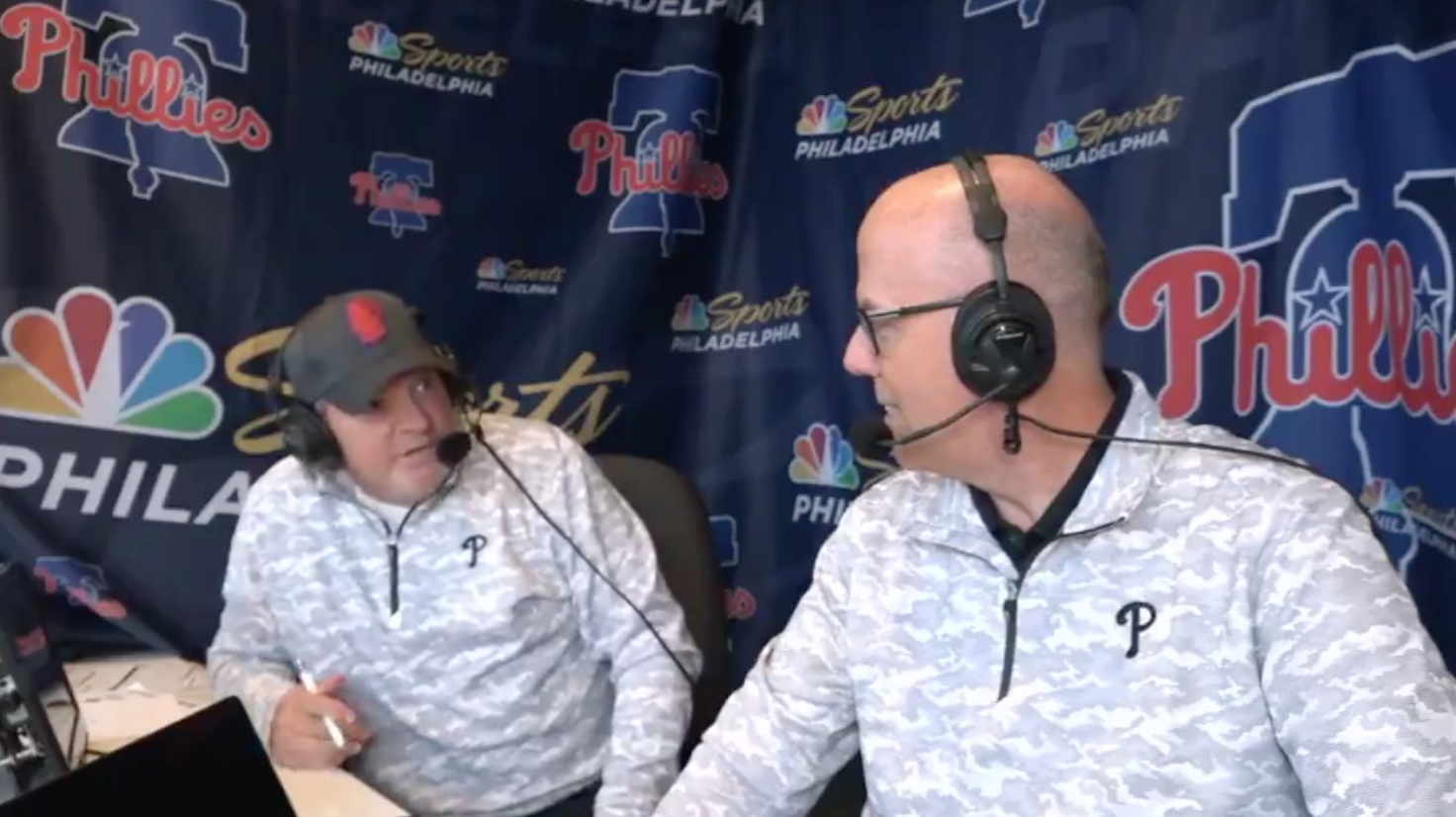Saturday night, two college football titans—hated rivals USC and Notre Dame—faced off in one of the most anticipated games of the year. Buoyed by a star-making performance from senior safety Xavier Watts (two interceptions, a fumble recovery and a touchdown), the Irish dominated from start to finish, handing the Trojans their first loss of the season while throwing a serious wrench in Caleb Williams’ bid for a second consecutive Heisman Trophy. But all anyone could talk about, both during and after the game, was NBC’s announcing team of Jason Garrett and Jac Collinsworth, the latter handling play-by-play duties for Saturday’s rout in South Bend.
If that name rings a bell, it’s because Jac’s father, former NFL receiver Cris Collinsworth, has been a staple of Sunday Night Football on NBC, serving as lead color analyst since 2009. The elder Collinsworth is one of the best in the business, and maybe Jac will get there someday, but Saturday proved the 28-year-old is still very much a work in progress, failing to meet the moment in his biggest assignment to date.
Naturally, Collinsworth’s relative lack of polish has sparked a larger discussion about nepotism in sports media, with many questioning his credentials while wondering if Collinsworth is qualified for his current role, leapfrogging more deserving broadcasters on the strength of his last name. Not only was Collinsworth ill-equipped for primetime, but his rapid ascent presents problematic optics that NBC will now have to answer for, fast-tracking a novice announcer in desperate need of seasoning.
None of this is necessarily Collinsworth’s fault. The Notre Dame alum has been a competent host and sideline reporter throughout his NBC tenure, though his play-by-play skills are still developing. There’s no shortcut to becoming a great broadcaster, an agonizing process of trial and error that takes years of training. Even then, most will never see the opportunity granted to Collinsworth, manning a network booth in one of the most watched games of 2023.
From an outsider’s perspective, it’s easy to resent Collinsworth for headlining a marquee event so early in his broadcast career and without the necessary reps to build credibility. Of course, he’s one of many in that regard, the latest in a long line of nepo babies infiltrating sports media.
Noah Eagle, son of longtime NBA and NFL announcer Ian Eagle, is already making a name for himself, adding Big Ten Saturday Night and Brooklyn Nets games on YES to his growing list of on-air responsibilities. Mike Golic Jr. has followed a similar trajectory, collaborating with his father, former ESPN personality Mike Golic, on various radio shows and podcasts. On the heels of an underwhelming pro career (where he was best known for an embarrassing interaction with Jon Gruden during training camp), Chris Simms was quick to join the family business, taking after his old man (CBS mainstay Phil Simms) by landing an analyst gig at NBC.
It’s certainly easier to get your foot in the door when your last name is Eagle or Golic, but are their contributions diminished by their lineage, propped up by powerful figures who carry enormous influence? Though his privileged upbringing and close proximity to fame surely gave Collinsworth a head start, cutting the line while other, arguably more skilled candidates struggled to get noticed, living in a parent’s shadow can be a double-edged sword.
The novelty factor of a famous son or daughter can’t be dismissed—it’s why Hailie Mathers has over three million followers on Instagram. We don’t need to be sold on something new when the brand already exists, granting easy access to viewers. For this reason, the Noah Eagles and Sam Ravech’s of the world are judged harsher than others, burdened by heightened expectations. Joe Schmo can slip through the cracks after a rough broadcast on local radio, but GoJo and Collinsworth aren’t afforded that same luxury. It might be easier for them to climb up the corporate ladder, bypassing low-level stops in obscure markets, but they’re also subject to unflattering comparisons from the Twitter peanut gallery, red meat for venomous online trolls in search of an easy target.
Playing devil’s advocate, you could argue that if Collinsworth really wanted to forge his own identity, he should have entered another line of work. Having said that, framing Collinsworth as failson riding Daddy’s coattails isn’t a fair characterization. If anything, the problem is overstated, a symptom of a struggling industry faced with far more pressing matters than nepotism.
Anyone who’s been put through the sports media ringer knows how hard it is to get discovered, working day and night for a break that, for most, will never materialize. Seeing Eagle and Collinsworth, before the age of 30, occupying precious television real estate might be mildly infuriating to some, but what would any of us do under the same circumstances? Who wouldn’t want a leg up in a field as competitive as broadcast journalism, using their connections to game the system?
We’re all products of our environment, after all. Eagle spent his childhood growing up in locker rooms and press boxes. So why wouldn’t he take after his father, making a career out of what was already his natural habitat? Eagle, if you’ve heard or seen him, is a phenomenal broadcaster and, by all accounts, a tireless worker, covering a variety of sports (NFL, NBA, MLB, college football and tennis) across multiple platforms. Let’s not forget Joe Buck and Ernie Johnson were born into sports royalty, both drawing inspiration from their fathers. The same goes for Kenny Albert, who has blazed his own trail, building on his father’s legacy as one of the most respected voices in broadcasting.
While nepotism in media does exist, it’s just as prevalent elsewhere in sports. Would Patriots assistant Steve Belichick be on an NFL coaching staff if Bill Belichick wasn’t his father? What about Cowboys executive Stephen Jones, whose front-office role is surely the result of his dad owning the team? HBO’s hit drama, Succession, based on the Murdoch family, revolves around this very subject, following four entitled siblings plotting with and against each other for their father’s throne. Throughout its four-season arc, you’ll find that none of them are even remotely qualified, chronic underachievers with an almost delusional confidence and complete absence of any real-life skills.
The fabric of our economy is built on these relationships, with many feeling a sense of loyalty—if not an obligation—to protect family at all costs. On a recent episode of Dax Shepard’s wildly popular Armchair Expert podcast, best-selling author Gabor Maté asked Shepard if he wanted his children to suffer the way he did, experiencing a difficult childhood that would ultimately strengthen his resolve and make him a better man. “Absolutely not,” said Shepard. “I don’t have necessarily faith that I could have achieved this or come to this place without [suffering], but I do have the faith that they can.” That’s not to say kids should be coddled, having their careers served to them on a silver platter (far be it for me to give parenting advice), but if Dad could pull a few strings to get his son a better job, why wouldn’t he?
In a perfect world, sports media would be a meritocracy rewarding the best and the brightest. But it’s not. No industry is. So why should we expect any different from broadcasting? That’s not the kind of philosophical switch you can suddenly turn on or off.
Is Collinsworth the victim? Maybe not. But there’s little doubt NBC set him up to fail, risking his long-term confidence by taking the training wheels off much too soon. It’s a preventable blunder and one that should warrant some level of accountability, though knowing NBC’s legendary stubborn streak, it wouldn’t be a surprise if it doubled down, feeding Collinsworth to the wolves with another baptism by fire.







